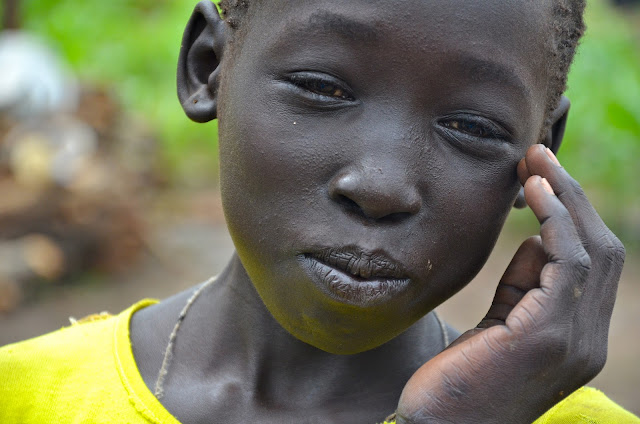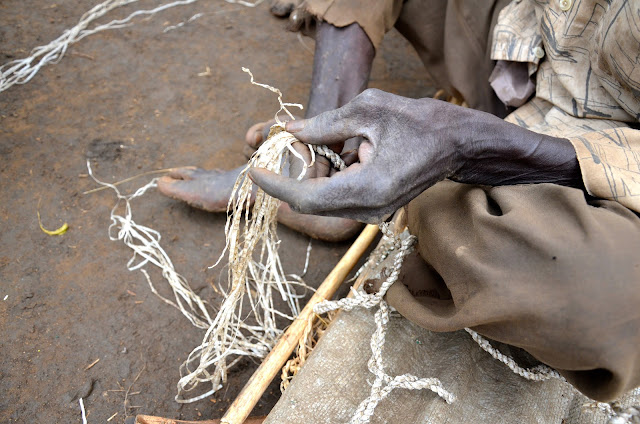
 I spotted Beja as my colleague, John, and I wandered around Yusuf Batil camp. It was my first time to see a young girl carrying water with the traditional stick close up. I had watched girls and women go back and forth to the tap stand from a distance. Beja seemed about to buckle under the weight of the jerry cans she was carrying. Later I was told they were both 20 litre containers. I greeted Beja: salaam aleikum. She hardly paid attention to me as she settled her load on the ground carefully, straining under the weight. Her back and shoulders seemed twisted by the sheer exertion of transporting the liquid load. I would have liked to ask how far she had walked. I regretted that I did not speak Arabic, unaware that this did not matter. Beja did not speak Arabic either.
I spotted Beja as my colleague, John, and I wandered around Yusuf Batil camp. It was my first time to see a young girl carrying water with the traditional stick close up. I had watched girls and women go back and forth to the tap stand from a distance. Beja seemed about to buckle under the weight of the jerry cans she was carrying. Later I was told they were both 20 litre containers. I greeted Beja: salaam aleikum. She hardly paid attention to me as she settled her load on the ground carefully, straining under the weight. Her back and shoulders seemed twisted by the sheer exertion of transporting the liquid load. I would have liked to ask how far she had walked. I regretted that I did not speak Arabic, unaware that this did not matter. Beja did not speak Arabic either.
We were in the middle of a cluster of tents that had been erected facing away from the road that runs through the refugee camp. In one of them, an elderly couple rested in the shade. In another, a woman wove dry reeds to make a basket.
 In a space I would call the communal yard, where the tents faced the makeshift kitchen, an old man sat on a pile of sticks. He was unravelling synthetic fibre from an old sack and plaiting it into strong chords which he would use to make a traditional bed. He was Beja's grandfather. He told us he fled to South Sudan from Blue Nile state with his daughter's family. He said there was war because people wanted to take their land.
In a space I would call the communal yard, where the tents faced the makeshift kitchen, an old man sat on a pile of sticks. He was unravelling synthetic fibre from an old sack and plaiting it into strong chords which he would use to make a traditional bed. He was Beja's grandfather. He told us he fled to South Sudan from Blue Nile state with his daughter's family. He said there was war because people wanted to take their land. Behind him in the kitchen we found Beja's mother. Amna was squatting on the ground with a child on her lap as she cooked on an open wood fire. She came out of the kitchen to talk with us. She said she had nine children. Six of them were with us that afternoon. Her husband was employed by an NGO in the refugee settlement; he was out at work.
Behind him in the kitchen we found Beja's mother. Amna was squatting on the ground with a child on her lap as she cooked on an open wood fire. She came out of the kitchen to talk with us. She said she had nine children. Six of them were with us that afternoon. Her husband was employed by an NGO in the refugee settlement; he was out at work. Amna said they walked for many weeks before reaching the border of South Sudan. She pointed out the leaves of the lalobe tree, bitter leaves that she boiled for her family to eat when their food ran out. Straddled on her hip was her severely malnourished three year old daughter, her youngest child, who was receiving treatment through a therapeutic feeding programme as an out-patient.
Amna said they walked for many weeks before reaching the border of South Sudan. She pointed out the leaves of the lalobe tree, bitter leaves that she boiled for her family to eat when their food ran out. Straddled on her hip was her severely malnourished three year old daughter, her youngest child, who was receiving treatment through a therapeutic feeding programme as an out-patient.  Beja's brother, Abdalla, offered a child's perspective. He said as they escaped he was afraid to be killed. On the way, he thought alot about food because they often went without. He sometimes thought about his 7th grade classmates who remained behind. Changing the topic, I asked what Abdalla wanted to do when he grew up. To be president of the Ngassana people (his ethnic group), came the reply. I asked what he would do as president. He said he would build multiple-storied buildings and provide health services for the people.
Beja's brother, Abdalla, offered a child's perspective. He said as they escaped he was afraid to be killed. On the way, he thought alot about food because they often went without. He sometimes thought about his 7th grade classmates who remained behind. Changing the topic, I asked what Abdalla wanted to do when he grew up. To be president of the Ngassana people (his ethnic group), came the reply. I asked what he would do as president. He said he would build multiple-storied buildings and provide health services for the people.  At 13 years of age, Abdalla had precise development aspirations for his people. I asked what he would do for his mother. Beja hovered in the background, unaware that I had my eye on her. That water carrying business was on my mind, and now I wanted to know her aspirations. Abdalla said he would build a big house for his mother, and make sure she always had alot of money. A child after my own heart, Abdalla was!
At 13 years of age, Abdalla had precise development aspirations for his people. I asked what he would do for his mother. Beja hovered in the background, unaware that I had my eye on her. That water carrying business was on my mind, and now I wanted to know her aspirations. Abdalla said he would build a big house for his mother, and make sure she always had alot of money. A child after my own heart, Abdalla was! Turning to his sister, with John translating into Arabic, I asked her her name. Abdalla responded, "Beja". I asked how old she was. Again, Abdalla responded, "Eleven." I asked that Abdalla be told to let Beja speak. He responded that she did not speak Arabic. I asked why. "She does not go to school," came the reply. I asked why. Abdalla responded matter of factly that Beja worked at home. I had forgotten the water carrying business.
Turning to his sister, with John translating into Arabic, I asked her her name. Abdalla responded, "Beja". I asked how old she was. Again, Abdalla responded, "Eleven." I asked that Abdalla be told to let Beja speak. He responded that she did not speak Arabic. I asked why. "She does not go to school," came the reply. I asked why. Abdalla responded matter of factly that Beja worked at home. I had forgotten the water carrying business.  Mindlessly I had assumed all the refugees spoke Arabic. We turned to Amna who said--in Arabic-- that she could not afford to let Beja go to school. Amna said she would make sure all of her children, sons and daughters alike, went to school... but not Beja. There was too much work to be done, too many household chores, the children to look after. It was evident that Amna had no choice. Abdalla said sheepishly that he helped his sister... sometimes.
Mindlessly I had assumed all the refugees spoke Arabic. We turned to Amna who said--in Arabic-- that she could not afford to let Beja go to school. Amna said she would make sure all of her children, sons and daughters alike, went to school... but not Beja. There was too much work to be done, too many household chores, the children to look after. It was evident that Amna had no choice. Abdalla said sheepishly that he helped his sister... sometimes.  As Beja attempted a shy smile for the camera, I could not help thinking this child was literally born into bondage, conditioned like millions of girl children throughout the world, to slave away daily. Though raised in the same household, her brother was already socialized into worldly aspirations; his dream was to lead a nation. Beja, on the other hand, seemed doomed to a life of fetching and carrying, denied the learning that would as a minimum give her life skills and empower her to aspire, like her brother.
As Beja attempted a shy smile for the camera, I could not help thinking this child was literally born into bondage, conditioned like millions of girl children throughout the world, to slave away daily. Though raised in the same household, her brother was already socialized into worldly aspirations; his dream was to lead a nation. Beja, on the other hand, seemed doomed to a life of fetching and carrying, denied the learning that would as a minimum give her life skills and empower her to aspire, like her brother. 


























No comments:
Post a Comment